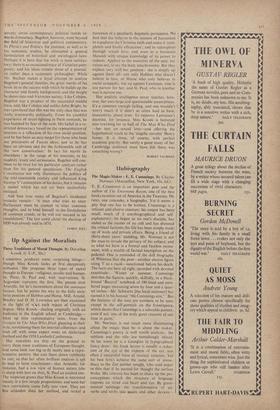Up Against the Moralists
Three Traditions of Moral Thought. By Dorothea Krook. (C.U.P., 30s.)
( AsiiiitioGi: produces some surprising things— though Miss Krook looks at first deceptively orthodox. She proposes three types of moral thought in Europe--religious, secular and human- ist. Plato, St. 'Paul and, with reservations, St. Augustine represent the first. She pauses over Aristotle, for he's inconsistent about the stuntman bottom, but he points the way to the fully secu- larist position of Hobbes and Hume. Mill, Arnold, Bradley and D. H. Lawrence are then examined in the light of w!vI each rejects of Christian. dogma. Miss Krook—dealing originally with an audience in the English school at Cambridge— takes up nine representative texts, from the (iorgias to The Man Who Died, glancing at their style, scrutinising them for internal coherence; and ends off with some expert notes on dialectical method and the 1958 Lambeth Conference.
Her moralists are thin on the ground to carry three main traditions of European thought, and some look too big to ,fit neatly into a repre- sentative pattern. She 'cuts them down ruthlessly to size; so that her often brilliant analysis is apt to lead to lame conclusions—that Aristotle, for instance, had a low view of human nature (she is sharp with him on this), St. Paul an exalted one, The suspicion grows that Miss Krook is interested mainly in a few simple propositions; and soon her own convictions Come fully into view. They are less orthodox than her method, and reveal a
humanist of a peculiarly dogmatic persuasion. We find that she believes in the mission of humanism to transform the Christian faith and make it 'com- pletely and finally efficacious'; and in redemption through sexual love; and even in a humanist Messiah with unique knowledge of its power to redeem. Applied to the moralists of the past, her values are, to say the least, anachronistic. But they explain very well her position : she is simply up against them all--not only Hobbes who doesn't believe in love, or Hume who only believes in social sympathy, but up against Lawrence, who is too narrow for her, and St. Paul, who in another way is narrow too.
Her analytic intelligence never touches, how- ever, her own large and questionable-assumptions. It's a common enough failing, and one wouldn't worry much if it didn't so often lead to basic insensitivity about texts. To improve Lawrence's doctrine, for instance, Miss Krook is betrayed into rewriting for us half of The Man Who Died —her text on sexual love—and offering the hypothetical result to the 'angelic novelist' Henry James. It is done, of course, with perfect academic gravity. But surely a good many of her Cambridge audience must have felt there was something wrong?
ROBERT TAUBMAN






































 Previous page
Previous page